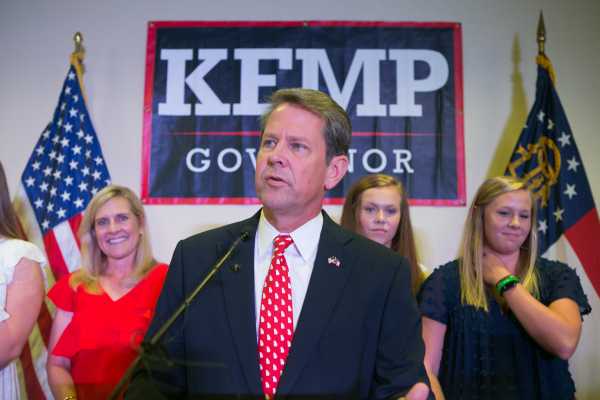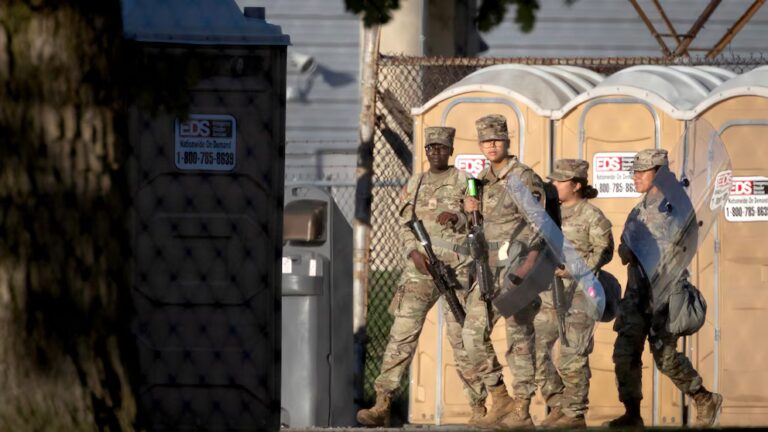
Part of
The 2018 midterm elections, explained
In the final days of Georgia’s tight governor race between Republican candidate Brian Kemp and Democratic candidate Stacey Abrams, things are heating up.
Kemp, who is Georgia’s secretary of state and also the chief officer overseeing the election, has been repeatedly accused by Democrats and civil rights groups of trying to influence the results. However, on Sunday, Kemp accused Democrats of attempting to hack the state’s voter registration system — a claim that has rankled Democrats.
“While we cannot comment on the specifics of an ongoing investigation, I can confirm that the Democratic Party of Georgia is under investigation for possible cyber crimes,” Candice Broce, a spokesperson for Kemp’s office, said in a statement on Sunday. “We can also confirm that no personal data was breached and our system remains secure.”
According to reports from investigative outlet WhoWhatWhy and the Associated Press, a lawyer representing election-security groups received a tip from a private citizen that it was possible to change voter information in Georgia’s online voter registration system. The lawyer, David Cross, then alerted the FBI and Kemp’s office to the issue on Saturday.
The AP explains what happened next:
When Kemp was made aware of the issue, he released the statement accusing Georgia Democrats of trying to break into the system. Democrats have maintained that the cybersecurity experts simply reviewed the websites and did not attempt to hack the state’s registration system.
Election experts like UC Irvine law professor Richard Hasen criticized the allegations and accused Kemp of voter manipulation and engaging in “some banana republic stuff” in a Slate article published Sunday. Georgia Democrats called the probe “a reckless and unethical ploy,” adding that the FBI was being used to support “false accusations.”
And during a Monday appearance on Good Morning America, Kemp’s opponent Stacey Abrams, who is running to become the first black woman governor in the US, argued that Kemp “cooked up the charge, because he realizes, once again, he left the personal information of six million voters vulnerable,” citing previous data leaks during Kemp’s eight-year tenure. Later in the day, Abrams added that Kemp was “abusing his power” by launching the probe so close to the election.
Kemp has defended his actions. “I’m not worried about how it looks. I’m doing my job,” he told reporters after a campaign rally on Monday. “This is how we would handle any investigation when something like this comes up.”
But the hacking allegations add to ongoing issues around voting in Georgia’s upcoming election — issues that have largely revolved around Kemp’s role overseeing an election he is also competing in. With the election coming up on Tuesday, these issues will likely call increased attention to the election outcome, especially if Kemp is victorious.
Kemp has been called out before for failing to address election security issues in Georgia
Kemp has long been criticized for Georgia’s poor election security, and problems with the state’s system are getting new attention in the wake of his allegations.
Two years ago, Kemp turned down the Department of Homeland Security’s offer to provide election and cybersecurity assistance before the 2016 election, arguing that the move would have given the federal government too much power over the state system. Shortly after the election, Kemp claimed that DHS made “an unsuccessful attempt to penetrate the Georgia Secretary of State’s firewall.” A subsequent Inspector General’s investigation found that Kemp’s suspected DHS hacker was just a government employee visiting a state website. Kemp has since accepted some assistance from DHS.
As the New York Times notes, Kemp’s office and related agencies have also been accused of mishandling voter data on two different occasions. In 2015, the state accidentally shared CDs containing the Social Security numbers and personal information of 6 million voters with political groups and media outlets (Kemp blamed the leak on a “clerical error”). In 2017, the FBI investigated a data breach at Kennesaw State University’s Center for Election Systems that exposed the data of close to 7 million voters; the breach was not fixed until six months after it was first reported. The university had been tasked with overseeing voting systems in the state for more than a decade. And when a lawsuit was filed to further investigate the KSU system breach, university technicians completely wiped the systems clean before they could be examined.
Federal courts have also recently criticized Georgia, one of just a handful of states that fully rely on electronic voting without any independent paper ballots, for having a system that election security experts say is more susceptible to electronic hacking.
In September, US District Judge Amy Totenberg ruled that Georgia could not be forced to adopt paper ballots before the election, but said there was “a mounting tide of evidence of the inadequacy and security risks” in the state’s system.
And in October, the NAACP filed a complaint saying that voting machines were incorrectly registering votes for Abrams as votes for Kemp.
Kemp has come under fire for remaining in office while running in the Georgia election
In recent weeks, Kemp has been criticized for a number of measures taken by his office, including voter purges that removed more than a million names from the state’s voter rolls between 2012 and 2016. He has also faced several complaints and lawsuits alleging that he is suppressing minority voters, particularly black voters, in an effort to keep Abrams from winning the election.
Several voting and civil rights groups, Abrams’s campaign, and former president Jimmy Carter have all called for Kemp to resign from his position as Georgia’s top elections official, arguing that it is a serious conflict of interest.
On October 9, the Associated Press reported that 53,000 voter registrations, 70 percent of them from black applicants, were being held by Kemp’s office for failing to clear an “exact match” process that compares registration information to Social Security and state driver records.
And on Friday, a federal court ruled that more than 3,000 voters incorrectly flagged as “noncitizens” by the exact match process must be allowed to vote in the upcoming election because the state failed to update their citizenship status after they were made US citizens. District Court Judge Eleanor Ross argued that there was “a very substantial risk of disenfranchisement” if these voters were not allowed to cast ballots in the election.
That same day, a federal appeals court ruled that Georgia must follow an October 24 ruling on absentee ballots. That ruling found that the state could no longer automatically throw out absentee ballots because of “signature mismatches,” where a voter’s signature on a ballot did not match the signature on their voter registration card.
There have been other issues as well, most notably when it comes to the high number of voters purged from voter rolls in the state. According to the Brennan Center, Kemp’s office purged roughly 1.5 million registered voters between the 2012 and 2016 elections. The AP reports that 670,000 voters were purged last year. A recent report from American Public Media finds that around 107,000 of these voters were purged due to a controversial “use it or lose it” law that removes voters from the rolls if they don’t vote for a certain amount of time.
Kemp has countered that much of the criticism of his office is misplaced, and that Abrams and other Democrats are attempting to hurt his campaign by “faking outrage for political gain.” Kemp added, in a recent press release, “Despite any claim to the contrary, it has never been easier to register to vote in Georgia and actively engage in the electoral process.”
But Kemp’s own statements have cast this into doubt. Last month, Rolling Stone reported on leaked audio of Kemp complaining about Abrams’s voter turnout operation, calling it a cause for “concern.”
Due to the tight nature of the Georgia contest (polls have repeatedly shown Kemp and Abrams in a dead heat over the past few weeks), it is possible that the race will go to a December 4 runoff, which is required if no candidate receives more than 50 percent of the vote.
Kemp has not commented on whether he will remain in office during a runoff, but he previously said during a debate with Abrams that he would not recuse himself if a recount is required.
Sourse: vox.com






